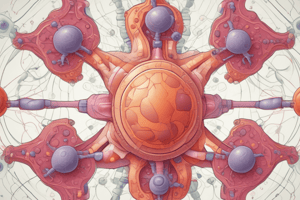Podcast
Questions and Answers
What are antibodies?
What are antibodies?
Antibodies are specialized, Y-shaped proteins that bind to the body's foreign invaders, such as viruses, bacteria, fungi, or parasites. They are produced by B-lymphocytes.
How do antibodies facilitate destruction of an invading organism?
How do antibodies facilitate destruction of an invading organism?
Antibodies protect against bacteria that multiply outside cells by facilitating uptake of the pathogen by phagocytic cells. Mechanisms include agglutination, precipitation, opsonization, complement fixation, and neutralization.
What cells produce antibodies?
What cells produce antibodies?
B cells, which are a type of lymphocyte, produce antibodies used to attack invading bacteria, viruses, and toxins.
How was Helga's body able to produce antibodies against E.coli O157 if she had never encountered it before?
How was Helga's body able to produce antibodies against E.coli O157 if she had never encountered it before?
What role did macrophages presumably play in the production of antibodies against the E.coli strain?
What role did macrophages presumably play in the production of antibodies against the E.coli strain?
What role did helper T cells presumably play in the production of antibodies against the E.coli strain?
What role did helper T cells presumably play in the production of antibodies against the E.coli strain?
How can Rothgar's immune system produce antibodies capable of attacking a wide variety of pathogens?
How can Rothgar's immune system produce antibodies capable of attacking a wide variety of pathogens?
If Helga encounters the same strain of E.coli again, why will she probably not get very sick?
If Helga encounters the same strain of E.coli again, why will she probably not get very sick?
What are MHC proteins?
What are MHC proteins?
Why are MHC proteins important for the immune response to E.coli O157?
Why are MHC proteins important for the immune response to E.coli O157?
How does blood circulation differ before and after birth?
How does blood circulation differ before and after birth?
What does the thymus do?
What does the thymus do?
Flashcards are hidden until you start studying
Study Notes
Antibodies
- Specialized Y-shaped proteins that target foreign invaders like viruses, bacteria, fungi, and parasites.
- Function as a part of the immune system’s search-and-destroy mechanism.
- Produced by B-lymphocytes.
Mechanisms of Antibody Action
- Facilitate bacterial destruction primarily by aiding phagocytic cells in pathogen uptake.
- Key mechanisms include agglutination, precipitation, opsonization, complement fixation, and neutralization.
B-cell Production
- B-cells, a type of lymphocyte, are responsible for antibody production.
- Function to attack invading microbes, toxins, and viruses.
Immune Response to E. coli O157
- The immune system selects B-cells that can produce specific antibodies against new pathogens like E. coli O157.
- Activation occurs after encountering the pathogen.
Role of Macrophages
- Engage and eliminate pathogens before presenting bacterial proteins via MHCII complexes.
- Assist in activating helper T-cells to stimulate B-cell responses.
Role of Helper T-cells
- Facilitates B-cell activation through antigen presentation by macrophages.
- Vital for triggering the antibody production process against antigens.
Diversity of Antibody Production
- Bone marrow stem cells in Rothgar continually generate new B-cells.
- Each B-cell undergoes random genetic rearrangement for varying antibody specificity.
Memory B-cells
- Some activated B-cells transform into memory B-cells after an initial immune response.
- Enable rapid antibody production upon re-exposure to the same pathogen.
Major Histocompatibility Complex (MHC) Proteins
- A complex of genes coding for cell surface proteins critical to the adaptive immune response.
- MHC molecules are essential for displaying pathogen-derived antigens to T-cells.
Importance of MHC in E. coli Response
- MHC proteins bind to antigens, facilitating T-cell recognition.
- Play a role in shaping future immune responses to pathogens.
Changes in Blood Circulation Before and After Birth
- Prenatal blood flow bypasses the lungs via the foramen ovale and ductus arteriosus.
- Post-birth changes redirect blood flow through the heart and to the lungs.
Function of the Thymus
- Produces hormones and is critical for the development of T-lymphocytes (T-cells) in the immune system.
- Proportionately larger in children compared to adults, reflecting its role in early immune development.
T-cell Receptors and Lymph Nodes
- T-cell receptors in lymph nodes provide support and necessary conditions for T-cells after their activation and functionality.
Studying That Suits You
Use AI to generate personalized quizzes and flashcards to suit your learning preferences.



